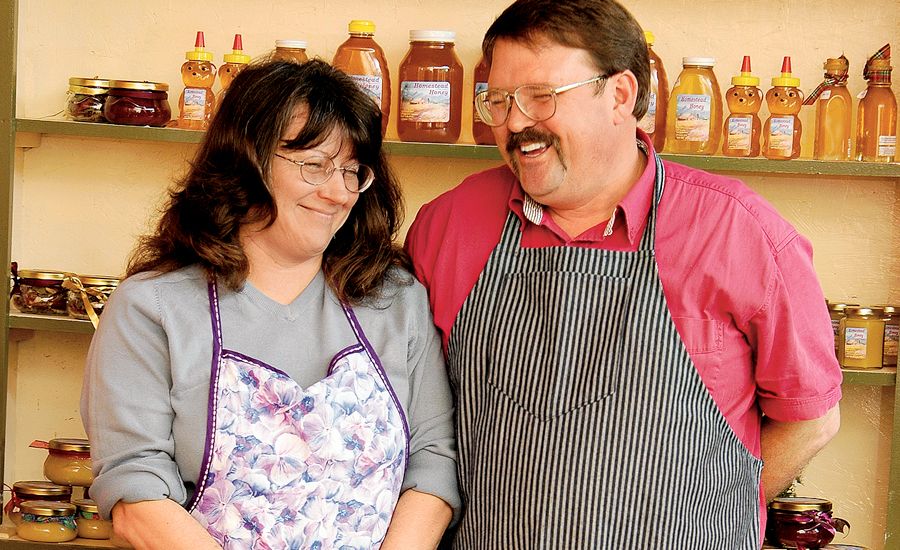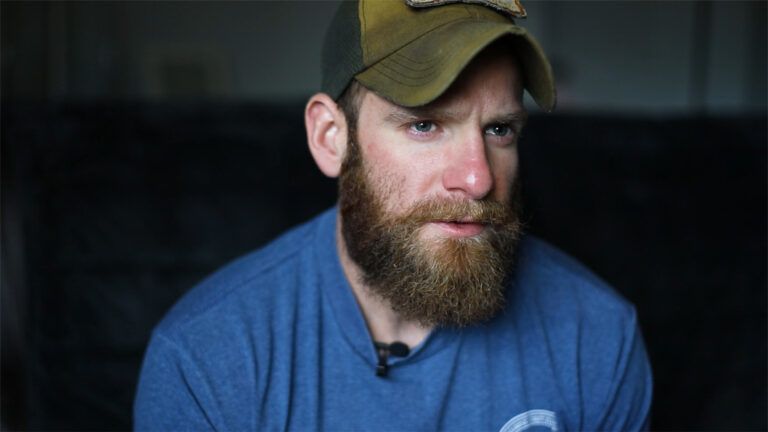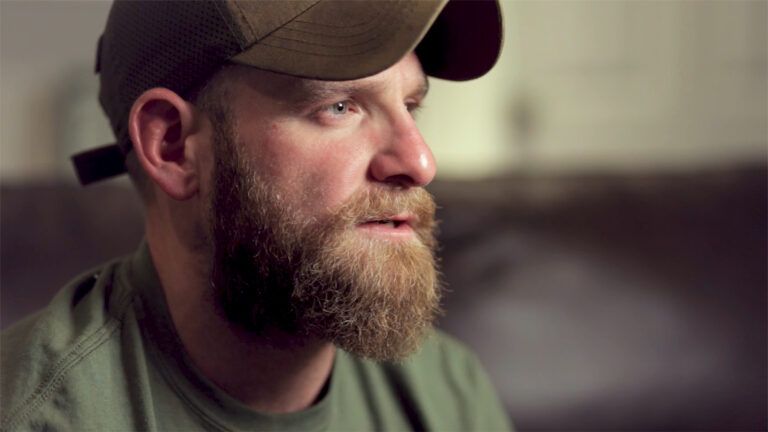As a behavioral health therapist at Fort Bragg, I deal with trauma. I see what war can do to human beings. PTSD. Traumatic brain injuries. Issues of trust and rebuilding relationships.

Ddoc is a Belgian Malinois, a retired military working dog. (The double letter in his name means he was bred to be an MWD at Lackland Air Force Base.)
Like this story so far? Subscribe to All Creatures magazine!
He is one of 650 canines who have served in Iraq and Afghanistan as sentries and scouts, sniffing out bombs, clearing buildings and protecting soldiers. Intense, dangerous missions. Ddoc and his fellow MWDs are tough and brave, loyal almost to a fault. But now he needed a loving home.
The family who had adopted him wasn’t able to keep him. I met him at their house. I already owned one Malinois, Ranger, and a German shepherd, Sofie. I’m not a professional handler, I just love dogs. Especially these dogs.
“We’re not keeping him,” my husband, Jeff, announced when I brought Ddoc home. “We can’t keep up with the dogs we have already.”
“Just until I can find him a good home,” I said. “Jeff, he’s a veteran. We owe him that much, at least.”
Jeff just shook his head. I got out food and water bowls. I have dozens of them. Jeff found a blanket and laid it on the floor for a bed. I’d already put Sofie and Ranger in another room.
Then I noticed something: Ddoc systematically searching the living room. He was tense, as if he was on a mission, clearing the space. It’s like he’s still on the front lines, I thought.
His muscles rippled under his fur. I could see his mind working. Finally Ddoc relaxed and lay on the blanket. I felt myself relax too.
BOOM! The house shook at the sound of practice rounds of artillery being fired at Bragg, some 40 minutes away. It was a noise I’d gotten used to. In the other room, Ranger and Sofie were quiet.
But Ddoc snapped to attention. He jumped up and frantically circled the coffee table, his eyes wild. Every few minutes he’d stop and turn his head, listening intently.
“Ddoc, it’s okay,” I said. “It’s all done now.”
He wouldn’t even look at me. He was shaking. As if he were somewhere else. I’d seen this same intense, haunted expression in the soldiers I’d counseled. A kind of paralyzing, debilitating fear. PTSD. Post-traumatic stress disorder.
But I could talk to a person and get some sense of what they were feeling, offer ideas for ways to manage the debilitating stress.
“Oh, Chloe,” Jeff said. “This poor dog. He’s really hurting.”
“I know,” I said. “I didn’t realize he had these problems.”
That night I called Ddoc’s former handler in Afghanistan and got the story. I hung up and looked over at Ddoc, curled up tight on his blanket. I prayed we’d get through the night without any loud noises. After what I’d just heard it seemed the most I could hope for.
“What happened to him?” Jeff asked.
“Just a few months ago he was out on patrol with his handler, Mike,” I said. “There was mortar fire. Ddoc and Mike were blown off their feet. Mike landed on top of Ddoc.
“He tried to return fire but Ddoc wouldn’t let him. He dragged Mike to a ditch and stood guard over him until it was safe to go back to the base. Ddoc spent the night under Mike’s bed. He wouldn’t stop trembling.
“The next morning, when Mike got his gear to go to breakfast, Ddoc wouldn’t come out from under the bed. He wouldn’t go on patrol. Finally they sent him home. Mike said Ddoc found fourteen IEDs. He saved soldiers’ lives, a lot of soldiers. But Mike doesn’t think he’ll ever be able to work again.”
Jeff stroked Ddoc’s side. “Ddoc’s a war hero,” he said. “He stays here. With us.”
That night Ddoc slept next to our bed and cried out in his sleep, his paws churning, jaw twitching. “Ddoc, it’s okay,” I whispered. “You’re safe here. I promise.” But what if he needed more help than I could give him?
Order Your Copy of the New Book, Always By My Side
We’d both been awake for hours when the first rays of sunlight streamed through the window. I got up and Ddoc followed me to the back door. “Go out,” I said. But he wouldn’t leave my side. I found a leash and we went out into the backyard.
A squirrel darted across the grass. Ddoc didn’t seem to even notice. He stood there, glued to my leg, a big strong dog literally afraid to move.
I knelt down beside him and hugged him, my hands stroking his fur. “Don’t worry, Ddoc,” I said. “I won’t let anything happen to you.” Ddoc just stared straight ahead, his muscles tensed.
Reluctantly I left for work, praying that Ddoc would be okay inside the house, that there wouldn’t be sudden loud noises. Back on base I sat with veterans one after the other and listened to how they were struggling to adjust to life at home. Their nightmares. Their troubled, convoluted thoughts.
I tried to follow my training, showing empathy while staying emotionally detached. But when I came home there was Ddoc, waiting for me, safe, thank God, but with the same needs, the same challenges. Only now I had no choice but to get involved. I was his caretaker.
I took him to the vet, who prescribed antidepressants and antianxiety medication. I gave him a pill anytime there was artillery fire. It took 30 minutes before the drug took effect. There was nothing I could do but try to support him until then.
I started taking Ddoc for long runs, going until I was exhausted. Ddoc barely seemed winded. I wasn’t sure how much our runs were helping. But at night he did seem to sleep better, his nightmares less frequent.
Maybe I shouldn’t have been surprised. We often put traumatized soldiers on exercise regimens to ease anxiety.
Still, Ddoc’s agitation would take hold. He’d whimper and pace. I’d hold a treat and slowly move my hand back and forth until I had his total attention. Redirection is what our vet called it.
“Good Ddoc,” I’d tell him, letting him take the treat from my hand. Then he’d go to his blanket and lie down with an immense sigh. He seemed lost, wary, unsure of himself. How often had I seen these symptoms?
When Ranger and Sofie came up to him he’d look away, refusing to even acknowledge them. He wouldn’t go to Jeff without tons of coaxing. Weeks passed. He still wouldn’t go outside unless I took him on the leash. Even then, unless we were running, I felt his weight pressed urgently against my leg.
I kept at it, gradually introducing Ddoc to new things, new people, always reassuring him. Every few days I took him to a quiet park or the pet store. I never pushed him. If he seemed uncomfortable I’d immediately take him to a “safe” spot.
Occasionally we’d meet someone that Ddoc would let pet him. Or a dog he’d let sniff him. Sometimes he’d sniff back. Small steps. But how far would they take us?
One day I bought a new toy, a puzzle the dog has to solve to get to some kibble inside. I hid it under the couch. Ddoc found and solved it in just a few minutes and gobbled down the kibble. He looked up at me and barked once, the message clear: “Do it again.”
That night, while I was making dinner, I glanced into the living room. There was Ddoc snuggled next to Jeff on the floor. A breakthrough!
That encouragement spilled over into my work, which could seem so hopeless at times. One tough day I came home to find Ddoc on his blanket. He didn’t budge. I let Ranger and Sofie out the back door and got Ddoc’s leash.
“It’s okay, Ddoc,” I said as we walked across the grass. “This is your home. No one’s going to hurt you.”
He looked up at me. Intently. He understands me! Slowly he licked my hand, a gentle, loving caress. I stroked the back of his head and his tail wagged faster with every pat. It’s working, I marveled. If Ddoc could come back then anyone could.
I knelt down and buried my face in his fur. “Ddoc, I’m always going to take care of you,” I said.
I thought of all the times I’d patiently tried to reassure him. It was the repetition, slow and deliberate, the consistent reassurance, that got us to this point. Healing was a journey, a process, not something you snapped out of.
It was the same with my patients. What they needed most from me was someone they could depend on to be there for them, with an unchanging message: Don’t give up. You’re not alone. You’re going to be okay.
I’d read recently that plans were under way at Fort Bragg for a memorial sculpture of a Malinois to honor the military working dogs killed in action in Iraq and Afghanistan. The unveiling was a few days later. A good outing for Ddoc, I figured. We didn’t have to stay through the whole deal.
The minute we got there I knew I’d messed up. There were hundreds of people, a line of handlers with their dogs, vets in the black vests of the Rolling Thunder motorcycle chapter. Motorcycles? I felt for Ddoc’s medication in my purse.
“Okay, Ddoc, if this is too much we don’t have to stay.” Words meant for me as well as him.
I led him to the edge of the crowd. Ddoc sat beside me, his eyes slowly scanning the people. A speaker was at the podium, a handler.
“Dogs have been used by the U.S. military in every conflict since the Revolutionary War,” he said. “In Iraq and Afghanistan they cleared thousands of miles of roads, searched buildings, the first ones in. Had it not been for their bravery many of us wouldn’t be here today.”
I glanced down at Ddoc proudly. A hero, just as Jeff had said.
“Special Forces dogs are reliable, loyal and brave,” the speaker said. “They consider their team to be their pack. And they will do anything to protect their pack.”
I thought about Ddoc standing guard over Mike after the mortar attack. Ddoc tugged at his leash and we eased a few feet into the crowd. The speaker finished to loud applause. Ddoc tensed and I slowly led him to the back again. But he quickly relaxed and pulled to go forward.
Step by step until we were nearly at the front. I looked at the people around me, veterans, handlers who’d lost their legs, but were here because of their dogs. We were here for a reason. A chance for Ddoc to know that he was still part of the pack.
We stayed long after most of the crowd had left. A few veterans stopped to introduce themselves, bending down to stroke Ddoc’s fur. His tail stood straight up, slowly waving, and his eyes met theirs. A moment of recognition and respect passed between them.
Then there were the dogs, military working dogs, civilian dogs. Ddoc happily sniffed them all; it was like a dog VFW convention.
Finally we made our way to the monument, the bronze sculpture of a Malinois in full military gear. In front of the sculpture were 58 concrete squares with the names of the dogs who’d given their lives. Ddoc sat next to the sculpture and I took his picture. He looked serene, a proud warrior.
A few weeks later I took Ddoc to work. The soldiers would smile when they saw him. They’d sit and pet him, and I could see the tension leaving them.
It was easier for them to talk with Ddoc there, as if each understood they shared a common experience. There was a comforting, healing presence in the room that definitely wasn’t me.
Today Ddoc is training to become a therapy dog. He’s still a warrior but on a new and different mission, one I am proud to serve with him. Our service dogs are coming home just like our men and women in uniform. All deserving of our respect, our love, our care and our prayers.
Resources for Families and Their Veterans
Want to adopt a retired military working dog? Get info and an application from the 341st Training Squadron’s website, www.37trw.af.mil.
Know a veteran with PTSD ? Here are some resources:
● The Veterans Crisis Line connects veterans and their families with VA responders 24 hours a day. Call (800) 273-TAL K (8255), then press 1. For more information or to use the Confidential Veterans Chat, go to veteranscrisisline.net.
● The VA’s Coaching Into Care program helps family and friends of returning vets find the right way to talk to their loved ones about getting supportive care. Call (888) 823-7458, e-mail coachingintocare@va.gov or visit mirecc.va.gov/coaching.
● Give an Hour offers free mental-health services to U.S. military personnel and their families affected by Iraq and Afghanistan. Go to giveanhour.org.
● At the Vet Center Combat Call Center, vets and their families can share their experiences in the military or readjusting to civilian life: (877) WAR-VETS (927-8387) or www.vetcenter.va.gov.






